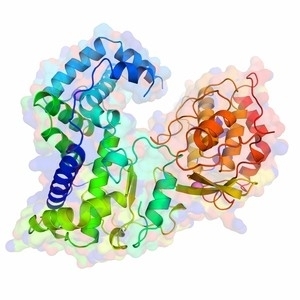


Glaucius Oliva speaks at FAPESP Week London about the line of work of the Center for Research and Innovation in Biodiversity and Drug Discovery and how the UK collaboration helps developing structural biology in Brazil (image: André Godoy/USP)
Published on 05/13/2021
By Heitor Shimizu, in London | Agência FAPESP – Structural biology combines the principles of molecular biology, biochemistry and biophysics to study the molecular and dynamic structure of macromolecules, especially proteins and nucleic acids.
The purpose is to understand how these molecules acquire their structure and how alterations in their structures affect their function. That knowledge can be used for such things as obtaining natural products from compounds for use in medicines to fight all kinds of diseases.
One of Brazil’s pioneers in the field, Glaucius Oliva, a full professor at the São Carlos Institute of Physics (IFSC) at the University of São Paulo (USP), spoke at FAPESP Week London, held February 11-12, 2019 in the British capital, about how he learned structural biology by working alongside Sir Tom Blundell, then professor at Birkbeck College-University of London (now the University of Cambridge), while conducting doctoral studies, which he completed at that English institution in 1988.
“British structural biology form the basis for structural biology in Brazil,” Oliva told Agência FAPESP. The knowledge acquired by collaborating with British scientists enabled Oliva to organize structural biology research groups in Brazil, thus developing the field there. “From 1995-2017, Brazil was responsible for a 400% increase in the percentage of publications in the field of structural biology around the world, and it is currently responsible for nearly 2.5% of the total generated,” said Oliva.
Thirty years after having studied with Blundell – and after having presided over the National Council for Scientific and Technological Development (CNPq) from 2011-2015 – Oliva currently heads up the Center for Research and Innovation in Biodiversity and Drug Discovery (CIBFar), one of the FAPESP Research, Innovation and Dissemination Centers (RIDCs).
CIBFar is an initiative that resulted from collaborative research studies involving the Laboratory of Medicinal and Computational Chemistry and the Laboratory of Molecular Biophysics at IFSC-USP, the Center for Bioassays, Biosynthesis and Ecophysiology of Natural Products at the Institute of Chemistry of São Paulo State University (UNESP), the Organic Synthesis Laboratory at the Institute of Chemistry at the University of Campinas (UNICAMP), the Natural Products and Organic Synthesis Laboratory at the Federal University of São Carlos (UFSCAR), and the Natural Products Laboratory of the University of São Paulo's Ribeirão Preto School of Pharmaceutical Sciences (FCFRP-USP).
“The mission of CIBFar is to promote advances that lead to effective drug discovery through basic and applied science, using biochemical, biological and pharmaco-biological tests, as well as advanced methods of medicinal chemistry, natural product chemistry, synthetic organic chemistry and molecular and structural biology,” he said.
Oliva explained that researchers at the Center use basic and applied science to develop technology to study plants, microorganisms, marine organisms, peptides and synthetic compounds in their quest for molecules deemed relevant.
“Those are molecules that can serve as targets for enzyme inhibition, phenotypical or computational tests,” he said. The ultimate goal is enabling the development of medicines to fight diseases such as Chagas, malaria, leishmaniasis, Zika, cancer and others.
During his session at FAPESP Week, held at the Royal Society, the UK’s science academy, on February 11, Oliva provided examples of crystal structures of enzymes obtained from tropical parasites found by CIBFar scientists, including glyceraldehyde 3-phosphate dehydrogenase, obtained from the Trypanosoma cruzi, the protozoan that transmits Chagas disease, and adenine-phosphoribosyltransferase, obtained from Leishmania, the parasite that causes leishmaniasis.
“More recently, we have conducted studies on the structural biology of proteins from the Zika virus, including crystallographic structures of the RNA NS5-dependent-RNA-polimerase (RdPd) [the enzyme found in the virus that catalyzes the replication of RNA], NS3-helicase [found in the Zika virus, it is an enzyme that promotes the opening of the RNA helix during the replication process] and NS3-protease [a protein synthesized by the virus to activate all vital proteins],” Oliva said.
“Our efforts are seeking to identify inhibitors and develop new candidates for antivirals. Besides the Zika virus, we have made important progress on structural and functional studies of other arboviruses circulating in Brazil, such as those that cause yellow fever and Chikungunya,” he adds.
New collaboration with the United Kingdom
“FAPESP Week London is an opportunity to interact with British scientists who are working in fields similar to ours, and CIBFar offers excellent opportunities for research collaboration with the United Kingdom. We already have several collaborative projects underway,” said Oliva.
The researcher cited the example of collaboration involving CIBFar researchers and those from the United Kingdom on the research project selected in January from a call for proposals issued by FAPESP in partnership with the Medical Research Council and the Newton Fund.
The purpose of the call for proposals is to finance Centers for Partnerships on Neglected Infectious Diseases. The centers will serve as a model for cooperation to foster stronger existing partnerships and establish the basis for new collaboration between British researchers and researchers from the state of São Paulo.
The project Oliva mentioned aims to investigate natural products in the search for chemical compounds that may be used to develop medicines to fight leishmaniasis and Chagas disease. In addition to Oliva, the project includes principal investigators Adriano Andricopulo (USP, project coordinator), Mônica Tallarico Pupo (USP), Vanderlan Bolzani (UNESP) and Paulo Cézar Vieira (UFSCAR). Principal investigators on the British side are Kevin Read, Ian Gilbert and Susan Wyllie from the University of Dundee.
Learn more about CIBFar at http://cibfar.ifsc.usp.br/english/.
Read more about FAPESP Week London at: www.fapesp.br/week2019/london/.
Source: https://agencia.fapesp.br/29785